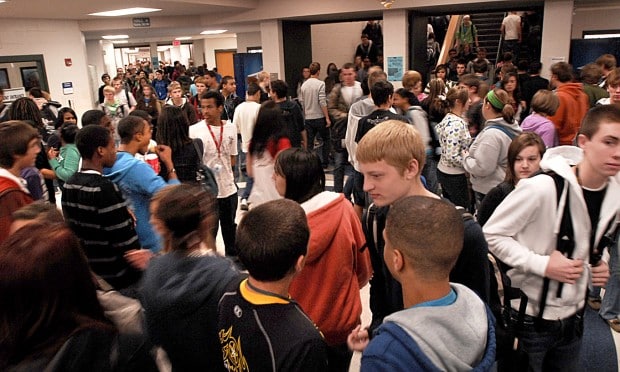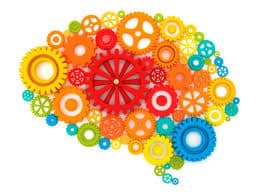By Jenni Werner, Literary Director and Resident Dramaturg of Geva Theatre, Rochester, NY

“When you get to be our age,” the late novelist Kurt Vonnegut once noted, “you all of a sudden realize that you are being ruled by people you went to high school with. You all of a sudden catch on that life is nothing but high school – class officers, cheerleaders, and all.”
Is it true? Are we doomed to live the lives we created for ourselves in high school?
A 2013 study released by the National Bureau of Economic Research would seem to support this notion, finding that high school social status has an impact on lifetime earning, with kids in the top 80th percentile in popularity earning up to 10% more as adults than those in the bottom 20th percentile. And Robert Crosnoe, a sociologist at the University of Texas at Austin and author of the book Fitting In, Standing Out, notes “Social scientists are realizing that many of our adult outcomes can be traced back at least in part to our experiences in high school.”
Oh no.
We’re not only shaping our identities as teenagers – we’re also forming extremely strong memories. Just before adolescence, the pre-frontal cortex – which helps us understand abstract concepts, control our impulses, reason and self-reflect – goes through some significant developments. So stimuli we receive during our teenage years, as we’re trying on our mature identities, makes a greater impact. “During times when your identity is in transition,” says developmental psychologist Laurence Steinberg, “it’s possible you store memories better than you do in times of stability.”
It’s appropriate, them that Molly Smith Metzler’s play The May Queen was partially inspired by the way our memories and experiences help to create our lifelong identities. “High school is an incredibly impressionable, vulnerable time because in so many ways, we’re shaping who we are as adults,” she says. “We can have an incredible impact on each other and not know it, and our memories can change and twist how we shape our own narratives about who we are.”

Perhaps surprisingly, the science of memory is an ever-loving field: Michael Malone, author of The Guardian of All Things: The Epic Story of Human Memory, suggests that we still don’t know that much about how our brains really store our memories. “What we do know is that – a quarter-million years after mankind inherited this remarkable organ we call the brain – even with all of the tools available to modern science, human memory remains a stunning enigma.”
Memories are created through a biochemical reaction in the brain, with short-term memory traveling along neurons in specific areas of the brain. Long-term memory, Malone says, is quite different. “What differentiates long-term memory in neurons is that frequent repetition of signals causes magnesium to be released – which opens the door for the attachment of calcium, which in turn makes the record stable and permanent. But as we all know from experience, memory can fade over time. For that, the brain has a chemical process called long-term potentiation that regularly enhances the strength of the connections (synapses) between the neurons and creates an enzyme protein that also strengthens the signal – in other words, the memory – inside the neuron.”
If our brains have a process for strengthening memories, why do some fade and others remain strong? There are competing ways to answer this question, the most recent of which is a 2013 study at Johns Hopkins University, which suggests that our memories are transformed each time we access them. “According to this theory,” says Emily Reas at Scientific American, “a memory is first encoded by the coordinated activity of neurons in the hippocampus and cortex. The hippocampus acts as the brain’s director, telling the cortex which particular neurons to activate. each time we recall that met, a similar, but not identical set of neurons are activated, Neurons that are frequently activated become part of the permanent memory trace in the cortex, while the rarely activated ones are lost. every reactivation re-encodes the memory, and depending on what cortical neurons are engaged, can strengthen, weaken, or update particular memory features.” So if we recall a memory frequently, it’s easier to access it and the memory itself becomes a more independent, stable resident in the brain.
According to more recent studies, when memories are tied to an emotional event, we may become exceedingly confident about what happened – but the confidence may be misplaced.

Elizabeth Phelps, professor of psychology at NYU, has been a lead investigator in several of these memory studies, and she explains what happens this way: “Emotion kind of focuses you on a few details but leads you to ignore other details. And if you are highly aroused by fear, that emotion will help you store things in your memory better, in a storage process called consolidation that depends on the on the interaction of the amygdala and hippocampus. But what we’ve known for a while is that emotion gives you a stronger confidence in your memory than it does necessarily in the accuracy. Usually, when a memory has highly vivid details and you’re confident in those details, that means you’re likely to be right. Confidence often goes hand in hand with accuracy. But when something is highly emotional, they often get separated.”
British novelist Julian Barnes writes, “Memory is identity… You are what you have done; what you have done is your memory; what you remember defines who you are; when you forget your life you cease to be, even before your death.” But if our memories are faulty, if we’re most likely to remember emotional events incorrectly, are we basing our identities on fiction? Phelps’ research suggest that our memories lead us to store the pieces of information we need in our lives, and the information we get wrong is often not essential. “Memory does work,” she says. “It’s good for a lot of things, but it’s not perfect. People have a naive view of what memory is supposed to be like, that it should always be accurate. That’s not the case. Our memory works for us in our lives, which doesn’t necessarily mean it’s 100 percent accurate.”
Come see PlayMakers Repertory Company’s gut-busting comedy The May Queen, performing Nov 22- Dec 11.
Click here to buy tickets or call 919.962.7529.